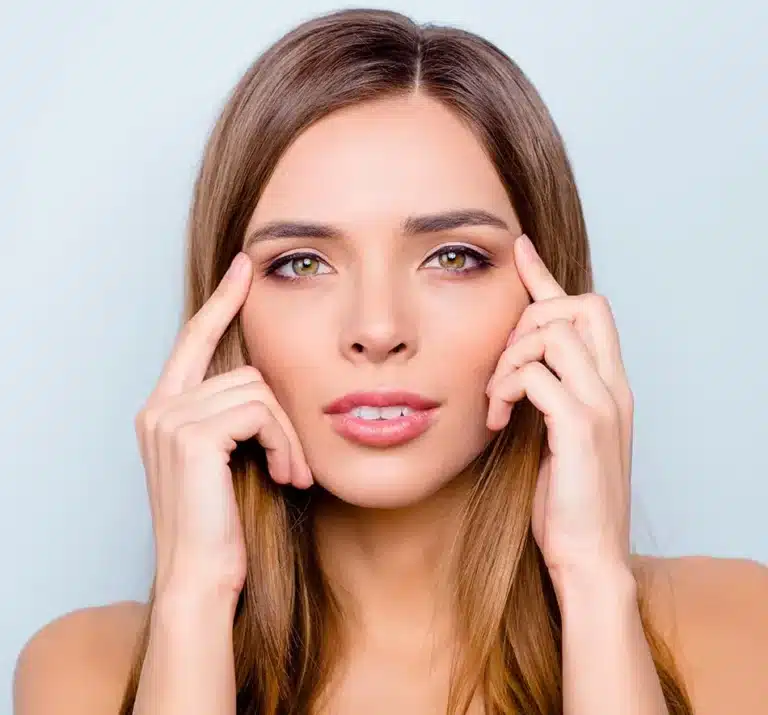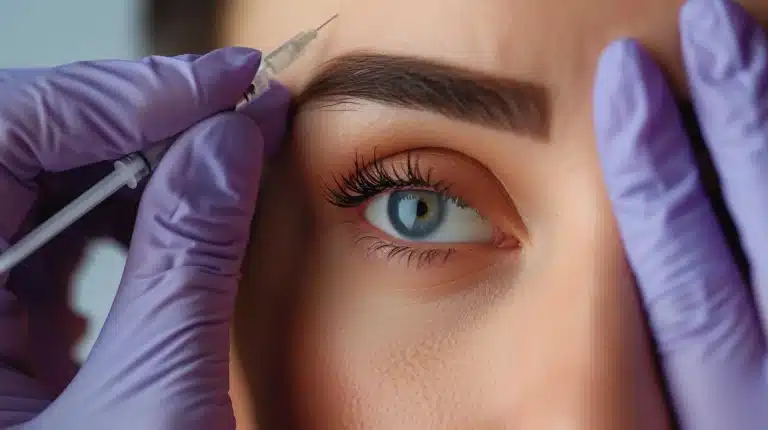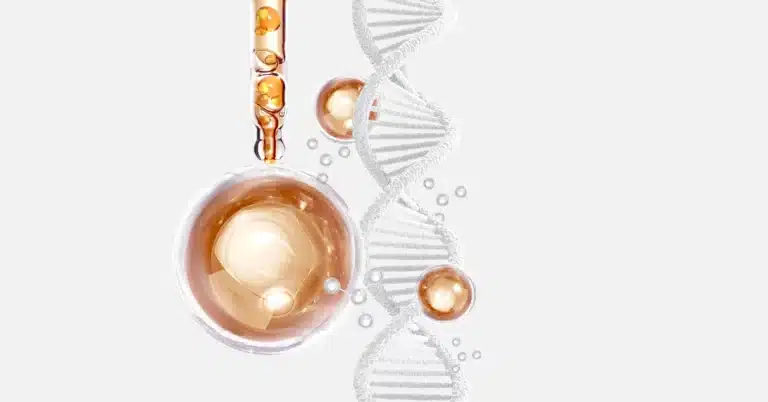Home » Conditions » Wrinkles » Crow's feet wrinkles
Crow’s feet wrinkles are lines that start from the outer corner of the eye and extend toward the temples. Their fan shape resembles a goose’s foot, hence the name.
They first appear with facial expressions and then persist at rest.
These wrinkles, along with those of the lower eyelid, age the gaze and give a tired look to the eye contour.
Crow’s feet wrinkles, also known as fine lines at the corner of the eyes, are among the most visible signs of skin aging. They usually appear starting in one’s thirties. To fight against crow’s feet wrinkles, available treatments include botulinum toxin and hyaluronic acid injections.
Hyaluronic acid fills in wrinkles, while botulinum toxin blocks the contraction of the muscles responsible for their formation.
More intensive treatments, such as peeling or resurfacing laser, may be suggested when crow’s feet wrinkles are more pronounced.

The appearance of crow’s feet wrinkles is inevitable. The age at which they appear varies depending on several factors.
Crow’s feet wrinkles gradually deepen over time. There are several degrees of severity, each requiring an appropriate approach.
At first, they may be seen as expressive and natural. However, as they become more pronounced, they can give the eyes a less radiant look, especially when smiling.
A precise evaluation by an experienced doctor helps determine the most suitable treatment for each stage of crow’s feet wrinkle severity.
At the early stage, these wrinkles appear as fine lines visible during facial expressions, especially when smiling. At this stage, botulinum toxin injections help relax the involved muscles and prevent the progression toward deeper wrinkles.
At the moderate stage, wrinkles become static, visible even at rest, and the skin begins to show signs of lost elasticity. Treatment is based on botulinum toxin and hyaluronic acid injections, the latter being used to restore the volume lost due to periorbital fat loss.
At the advanced stage, crow’s feet wrinkles are deep and permanent, often accompanied by uneven skin texture and a significant loss of skin thickness. More intensive treatments, such as laser resurfacing or chemical peelings, are recommended to stimulate collagen production and improve skin quality.

Facial gymnastics is one of the natural anti-wrinkle techniques used to prevent the appearance of crow’s feet.
It is a complementary method that cannot replace botulinum toxin injections.
Ten times a day, for one minute, place three fingers at the tail of the eyebrow and the outer corner of the eye. During a forced smile, smooth out the area with your fingers.
Daily application of moisturizing skincare also helps maintain the skin’s suppleness.
Treatments for crow’s feet wrinkles help restore a smooth and youthful eye contour.
Medical techniques such as botulinum toxin and hyaluronic acid injections, as well as fractional and continuous ablative laser treatments, effectively eliminate wrinkles around the eyes. These treatments block muscle contraction and stimulate collagen production, improving skin elasticity and visibly reducing signs of aging. In addition to smoothing fine and deep wrinkles, these procedures can also even out skin texture and restore its natural radiance. The results are long-lasting, with a noticeable improvement in skin firmness and suppleness.
The treatment is personalized, but the most commonly performed technique is botulinum toxin injection.

How does botulinum toxin act on crow’s feet wrinkles ? The injection of botulinum toxin blocks the activity of the outer part of the orbicularis muscle.
Three points are injected on each side. A slight warming sensation is felt during the injection.
A static and dynamic muscular analysis, as well as a study of the lower orbital area, must precede the treatment.
The injection must be customized.
It is often combined with the injection for the frown lines, which also helps open up the gaze.
The treatment of crow’s feet wrinkles is part of a global approach to rejuvenating the eyes and the face.
Botulinum toxin injections smooth out wrinkles, open up the gaze, and give the face a more relaxed and refreshed appearance. Wrinkles in the lower eyelid area will be slightly improved.
How long does botulinum toxin last ? Results are visible two days after the injection and optimal by the seventh day, lasting five to six months. Dr. Romano always schedules a follow-up appointment for a free touch-up seven to fifteen days later.
The result must look natural.
After-effects are almost nonexistent : bruising is extremely rare, and slight swelling at the injection points may last for about ten minutes.
Normal activities (except sports, hairdressing, and eyebrow treatments) can be resumed immediately afterward.
A failed injection of crow’s feet wrinkles can cause cheek immobility when smiling, persistent swelling (edema) of the lower eyelid, and drooping of the upper eyelid (ptosis). Hence the importance of consulting an experienced physician.

Hyaluronic acid injections can complement botulinum toxin treatments in cases of fat loss or skin thinning at the outer corner of the eye.
This technique must be performed by an experienced doctor. The risks include product visibility in the form of bumps or lumps at rest or when smiling, and the appearance of persistent swelling (edema).
The injection is often performed with a cannula, and the acid may be placed under the skin or beneath the muscle. The latter injection plane, technically more complex, is preferable and is the one used by Dr. Romano.
The acid used must be very low in hydrophilicity.
If there is fat reduction in the temple area and at the tail of the eyebrow, injecting these zones opens up the gaze and reduces the formation of folds.
The result of hyaluronic acid injection is immediate. The hollow at the outer corner of the eye is filled, wrinkles are smoothed, and the eye contour appears refreshed and rejuvenated. Unlike botulinum toxin injections, this treatment does not open up the gaze.
The result lasts about one year. Normal activities can be resumed immediately, and bruising is rare.

The treatment of crow’s feet wrinkles with ablative laser, both fractional and continuous, is a technique that effectively reduces crow’s feet and rejuvenates the skin.
The fractional ablative laser creates micro-perforations in the skin, which stimulate collagen production and promote skin regeneration while leaving surrounding tissues intact. This method is effective in improving skin density and firmness and visibly reducing crow’s feet wrinkles.
Additionally, the continuous ablative laser uniformly removes the superficial layers of the skin, allowing for an overall improvement of the skin’s surface and a reduction of deep wrinkles.
By combining these two modalities — continuous and fractional — both fine lines and deeper wrinkles can be treated simultaneously.

Peeling can help reduce crow’s feet wrinkles by improving skin quality. Depending on its intensity, it exfoliates the superficial skin layers, stimulates cell renewal, and smooths fine lines. This treatment is recommended when the skin shows an uneven texture, along with loss of radiance or firmness. It can be combined with botulinum toxin injections to optimize results. The choice of peeling (superficial peeling or medium peeling) depends on skin thickness, phototype, and the degree of skin aging.
Prices vary depending on the number of areas treated and the patient’s sex, as men typically require higher doses due to stronger muscle mass. The crow’s feet “zone” is often treated together with the frown lines to open up the eyes and avoid altering the natural shape of the brow.
For women
For men
It is also possible to combine this treatment with other techniques, such as ablative laser (starting from 350 CHF per session, with an average of 3 to 4 sessions required) or hyaluronic acid injections if fat loss is present. The cost of one syringe of hyaluronic acid is 600 CHF.
Recovery time depends on the type of laser used. For fractional ablative laser, recovery time varies from a few days to a week. For the continuous ablative laser, the recovery period is longer, one to two weeks.
Treatments may cause mild to moderate discomfort. Topical anaesthetics can be used to minimise discomfort.
Diet plays an important role in skin aging and the appearance of crow’s feet wrinkles.
A balanced diet rich in fruits, vegetables, essential fatty acids, and antioxidants helps preserve skin youthfulness and elasticity.
To prevent the appearance of crow’s feet wrinkles, it is essential to maintain good skin hydration. A balanced diet rich in antioxidants helps protect the skin against damage caused by free radicals. It is recommended to limit sun exposure, adopt healthy lifestyle habits, and avoid tobacco and alcohol.
Cosmetic and medical treatments remain the most effective method.
To treat crow's feet wrinkles, we recommend using specific creams containing active ingredients known for their effectiveness.
There is no specific age at which to begin treatment. Some people start as soon as the first dynamic wrinkles appear, generally in their thirties, while others wait until the wrinkles become static.
Results can last from several months to several years, depending on the treatment carried out and the type of skin. Maintenance sessions are necessary to maintain the result.
Hydration is essential in preventing crow’s feet wrinkles, as well-hydrated skin is more supple and less prone to fine lines. By using suitable eye contour products, the skin barrier can be kept healthy, delaying the appearance of signs of aging. It is recommended to choose products containing moisturizing ingredients such as hyaluronic acid or glycerin.
Facial gymnastics can help strengthen the muscles around the eyes and reduce the appearance of crow's feet wrinkles. For example, regular practice of rapid eye blinking or forehead muscle contraction exercises can help tone the periocular area.
Side effects include redness, swelling, bruising and temporary skin sensitivity. Complications are rare if the treatment is carried out by an experienced doctor.